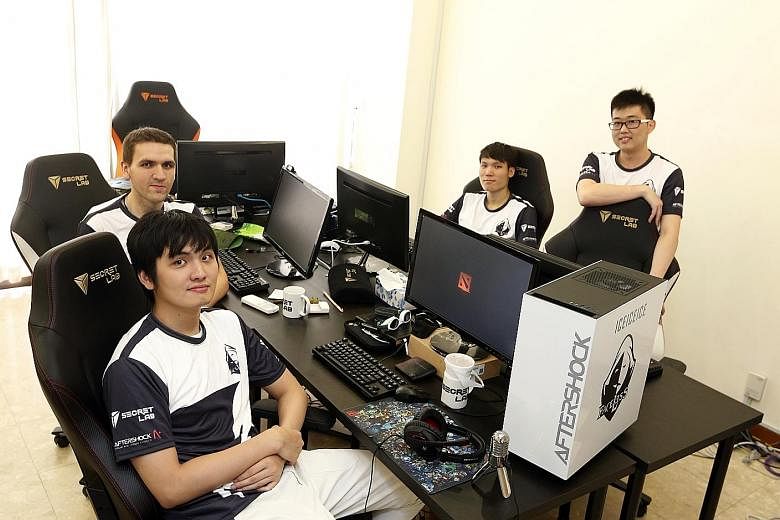From the outside, the house looks unassuming.
A nondescript brown-and-beige unit in Tanah Merah; pool-facing, relatively quiet, with a scattering of flip-flops at the front door.
But inside, five professional gamers live and train together 24/7, with a single common goal: to be world champions.
The first e-sports team house in Singapore belongs to Team Faceless, a five-man squad dedicated to the popular multiplayer online game Dota 2.
While such dedicated e-sports training quarters are common in countries with a strong e-sports culture, such as China and South Korea, Singapore has never had such an establishment.
Team Faceless is captained by Daryl "iceiceice" Koh, 26, and on the roster are Dominik "Black^" Reitmeier, 23, Anucha "Jabz" Jirawong, 17, Wong "NutZ" Jeng Yih, 27, and Toh "xy-" Wai Hong, 25.
The team is the brainchild of Mr Koh and Mr Wong, who had been playing overseas in China and South Korea respectively.
The pair wanted to return to Singapore to play on home turf, as well as to explore the potential of the South-east Asia (SEA) Dota 2 scene. Mr Koh said that, although the region has good players, the e-sports scene in the region is lacklustre as there is a dearth of a consistent, strong line-up of tournaments and top-tier teams.
He said: "The SEA scene is unique because players are from different countries and speak different languages. They are strong, but there is no leadership and no support."
So, the two set about recruiting players - home-grown talent Mr Toh, as well as Thai player Jirawong and Mr Reitmeier, who hails from Germany - and Team Faceless was founded on Sept 13.
Operational costs, including the $4,800 monthly rent for the four- bedroom, four-storey town house, are covered by Mr Koh, out of his earnings from his time in China as well as his income from streaming.
All the players agree that living together in a team house has made it much easier to improve.
As Dota 2 is a five-versus-five multiplayer online battle arena game, where teams vie to take down the opponent's base, teamwork is critical.
Mr Reitmeier said: "When you live together, it is much easier to discuss (strategies), to watch replays, and to improve together. It is also easier to trust someone when you know them on a personal level."
Mr Wong added that having a team house instils a level of discipline and rigour in the team. "If teams train online only, it can be very troublesome as people can go missing any time they like," he said.
Team Faceless follows a strict schedule. After lunch - which is usually ordered in or bought back, as none of the players cook - they get ready for gruelling sets of matches against other teams.
These "scrims" take place at 2pm, 4pm, 7pm and 9pm daily, while the players discuss strategies and plays in between.
Team Faceless' first big tournament will be the Boston Major, one of Dota 2 publisher Valve's three annual marquee events. The finals will be in December, with a prize pool of US$3 million (S$4.2 million).
This is just one of many global tournaments for Dota 2, the biggest of which is The International, which takes place annually.
The last International, which was held in August in Seattle, had a prize pool of more than US$20 million.
If they do win a cut of the prize pool, 10 to 15 per cent of it will go to Mr Koh to cover operational costs, and the rest will be split equally among the five players.
Unlike some other organisation-owned teams, where players draw a stable salary, Team Faceless has to rely on winnings to keep themselves in the green. As Mr Reitmeier put it simply: "If we don't win, we don't eat."
While Team Faceless is independent, local companies such as gaming-chair manufacturer Secretlab and custom gaming-PC maker Aftershock have stepped in with gear and equipment sponsorship to the tune of over $30,000.
For now, Mr Koh plans to continue funding the team for at least a year and may extend it, depending on the team's performance and how the SEA scene grows.
Their ultimate goal? "To stay the best in the world. That's pretty much about it."


